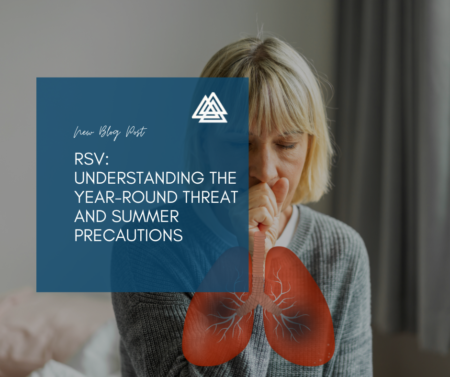 Respiratory Syncytial Virus (RSV) is often associated with cold and flu season, but it’s important to recognize that RSV poses a year-round threat. While the virus is more common in the fall and winter months, it can still spread during the summer, particularly affecting young children, older adults, and those with weakened immune systems. Understanding RSV and taking precautions during the summer can help prevent its spread and protect vulnerable populations.
Respiratory Syncytial Virus (RSV) is often associated with cold and flu season, but it’s important to recognize that RSV poses a year-round threat. While the virus is more common in the fall and winter months, it can still spread during the summer, particularly affecting young children, older adults, and those with weakened immune systems. Understanding RSV and taking precautions during the summer can help prevent its spread and protect vulnerable populations.
What is RSV?
RSV is a common respiratory virus that typically causes mild, cold-like symptoms. However, it can be severe in certain groups, leading to bronchiolitis, pneumonia, and other serious respiratory illnesses. The virus is highly contagious and spreads through respiratory droplets when an infected person coughs or sneezes. It can also be transmitted by touching surfaces contaminated with the virus and then touching the face.
Symptoms of RSV
RSV symptoms can vary from mild to severe and usually appear within 4 to 6 days after exposure. Common symptoms include:
- Runny nose
- Decreased appetite
- Coughing
- Sneezing
- Fever
- Wheezing
In severe cases, especially in infants and older adults, RSV can cause significant respiratory distress, leading to hospitalization.
The Year-Round Threat of RSV
While RSV is most prevalent during the colder months, it does not disappear in the summer. Various factors contribute to its year-round presence:
Increased Travel
Summer is a peak time for travel and social gatherings, increasing the likelihood of RSV transmission. People traveling from areas with ongoing RSV activity can bring the virus to new locations.
Daycare and Summer Camps
Children attending daycare and summer camps are at higher risk of contracting and spreading RSV due to close contact with others. These settings often involve shared toys and surfaces, which can harbor the virus.
Air Conditioning
Air-conditioned environments can contribute to the spread of RSV. Enclosed spaces with recirculated air, such as offices, shopping malls, and public transportation, can facilitate the transmission of respiratory viruses, including RSV.
Summer Precautions to Prevent RSV
Taking precautions during the summer can help reduce the risk of RSV transmission. Here are some practical steps to protect yourself and others:
1. Practice Good Hygiene
Regular hand washing is one of the most effective ways to prevent the spread of RSV. Wash your hands thoroughly with soap and water for at least 20 seconds, especially after being in public places, touching surfaces, or caring for someone who is sick. Use hand sanitizer if soap and water are not available.
2. Clean and Disinfect Frequently Touched Surfaces
Surfaces that are frequently touched, such as doorknobs, light switches, toys, and mobile devices, should be cleaned and disinfected regularly. Use household disinfectants that are effective against respiratory viruses.
3. Avoid Close Contact with Sick Individuals
If you or someone in your household is sick, avoid close contact with others to prevent the spread of RSV. This is particularly important for protecting infants, older adults, and individuals with underlying health conditions.
4. Stay Home When Sick
If you or your child has symptoms of RSV, stay home to avoid spreading the virus to others. Rest and hydration are crucial for recovery, and staying home helps protect the community.
5. Maintain Respiratory Hygiene
Cover your mouth and nose with a tissue or your elbow when coughing or sneezing. Dispose of tissues immediately and wash your hands. Encourage children to practice good respiratory hygiene as well.
6. Ensure Good Ventilation
Good ventilation can help reduce the concentration of respiratory droplets in indoor environments. Open windows and doors when possible, and use fans to improve air circulation. In air-conditioned spaces, ensure that the HVAC system is well-maintained and filters are regularly replaced.
7. Be Cautious in Crowded Places
Avoiding crowded places and maintaining physical distance can reduce the risk of RSV transmission. If you must be in a crowded setting, consider wearing a mask, especially if you are at higher risk for severe RSV infection.
Special Considerations for Vulnerable Populations
Infants and Young Children
Infants and young children are particularly susceptible to severe RSV infection. Parents and caregivers should take extra precautions to protect them:
- Limit Exposure: Avoid large gatherings and close contact with people who have cold-like symptoms.
- Breastfeeding: If possible, breastfeed infants to help boost their immune system.
- Vaccination: Stay up-to-date with recommended vaccinations, as they can help prevent secondary infections that may complicate RSV.
Older Adults and Immunocompromised Individuals
Older adults and those with weakened immune systems should also take additional measures to protect themselves from RSV:
- Health Monitoring: Regularly monitor for symptoms and seek medical attention if respiratory issues arise.
- Preventive Measures: Follow all recommended hygiene practices and avoid exposure to sick individuals.
- Healthcare Consultation: Discuss preventive strategies and potential treatments with healthcare providers.
RSV is a year-round threat that requires vigilance and proactive measures to prevent its spread. By understanding the risks and taking appropriate precautions, especially during the summer, we can protect ourselves and our loved ones from this potentially serious respiratory virus. Practicing good hygiene, maintaining clean environments, and being mindful of vulnerable populations are key steps in reducing the impact of RSV. Stay informed, stay safe, and enjoy a healthy summer.
